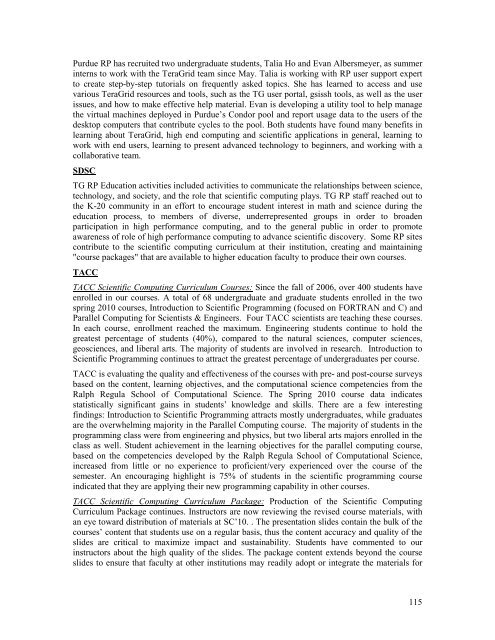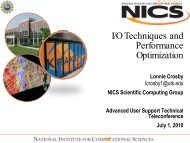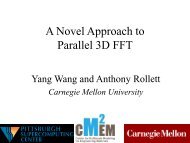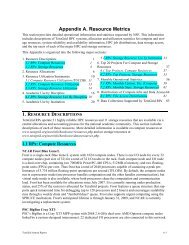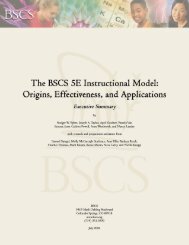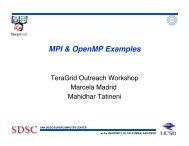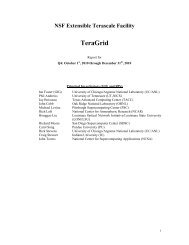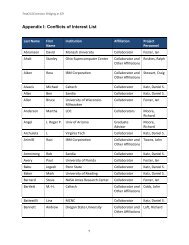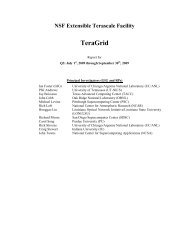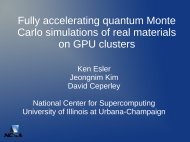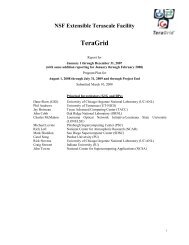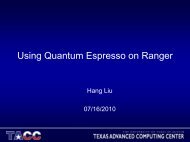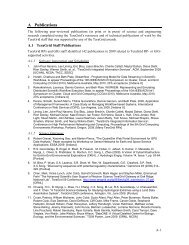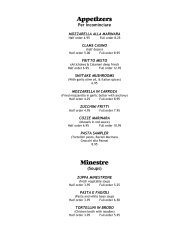TGQR 2010Q2 Report.pdf - Teragridforum.org
TGQR 2010Q2 Report.pdf - Teragridforum.org
TGQR 2010Q2 Report.pdf - Teragridforum.org
Create successful ePaper yourself
Turn your PDF publications into a flip-book with our unique Google optimized e-Paper software.
Purdue RP has recruited two undergraduate students, Talia Ho and Evan Albersmeyer, as summer<br />
interns to work with the TeraGrid team since May. Talia is working with RP user support expert<br />
to create step-by-step tutorials on frequently asked topics. She has learned to access and use<br />
various TeraGrid resources and tools, such as the TG user portal, gsissh tools, as well as the user<br />
issues, and how to make effective help material. Evan is developing a utility tool to help manage<br />
the virtual machines deployed in Purdue’s Condor pool and report usage data to the users of the<br />
desktop computers that contribute cycles to the pool. Both students have found many benefits in<br />
learning about TeraGrid, high end computing and scientific applications in general, learning to<br />
work with end users, learning to present advanced technology to beginners, and working with a<br />
collaborative team.<br />
SDSC<br />
TG RP Education activities included activities to communicate the relationships between science,<br />
technology, and society, and the role that scientific computing plays. TG RP staff reached out to<br />
the K-20 community in an effort to encourage student interest in math and science during the<br />
education process, to members of diverse, underrepresented groups in order to broaden<br />
participation in high performance computing, and to the general public in order to promote<br />
awareness of role of high performance computing to advance scientific discovery. Some RP sites<br />
contribute to the scientific computing curriculum at their institution, creating and maintaining<br />
"course packages" that are available to higher education faculty to produce their own courses.<br />
TACC<br />
TACC Scientific Computing Curriculum Courses: Since the fall of 2006, over 400 students have<br />
enrolled in our courses. A total of 68 undergraduate and graduate students enrolled in the two<br />
spring 2010 courses, Introduction to Scientific Programming (focused on FORTRAN and C) and<br />
Parallel Computing for Scientists & Engineers. Four TACC scientists are teaching these courses.<br />
In each course, enrollment reached the maximum. Engineering students continue to hold the<br />
greatest percentage of students (40%), compared to the natural sciences, computer sciences,<br />
geosciences, and liberal arts. The majority of students are involved in research. Introduction to<br />
Scientific Programming continues to attract the greatest percentage of undergraduates per course.<br />
TACC is evaluating the quality and effectiveness of the courses with pre- and post-course surveys<br />
based on the content, learning objectives, and the computational science competencies from the<br />
Ralph Regula School of Computational Science. The Spring 2010 course data indicates<br />
statistically significant gains in students’ knowledge and skills. There are a few interesting<br />
findings: Introduction to Scientific Programming attracts mostly undergraduates, while graduates<br />
are the overwhelming majority in the Parallel Computing course. The majority of students in the<br />
programming class were from engineering and physics, but two liberal arts majors enrolled in the<br />
class as well. Student achievement in the learning objectives for the parallel computing course,<br />
based on the competencies developed by the Ralph Regula School of Computational Science,<br />
increased from little or no experience to proficient/very experienced over the course of the<br />
semester. An encouraging highlight is 75% of students in the scientific programming course<br />
indicated that they are applying their new programming capability in other courses.<br />
TACC Scientific Computing Curriculum Package: Production of the Scientific Computing<br />
Curriculum Package continues. Instructors are now reviewing the revised course materials, with<br />
an eye toward distribution of materials at SC’10. . The presentation slides contain the bulk of the<br />
courses’ content that students use on a regular basis, thus the content accuracy and quality of the<br />
slides are critical to maximize impact and sustainability. Students have commented to our<br />
instructors about the high quality of the slides. The package content extends beyond the course<br />
slides to ensure that faculty at other institutions may readily adopt or integrate the materials for<br />
115


